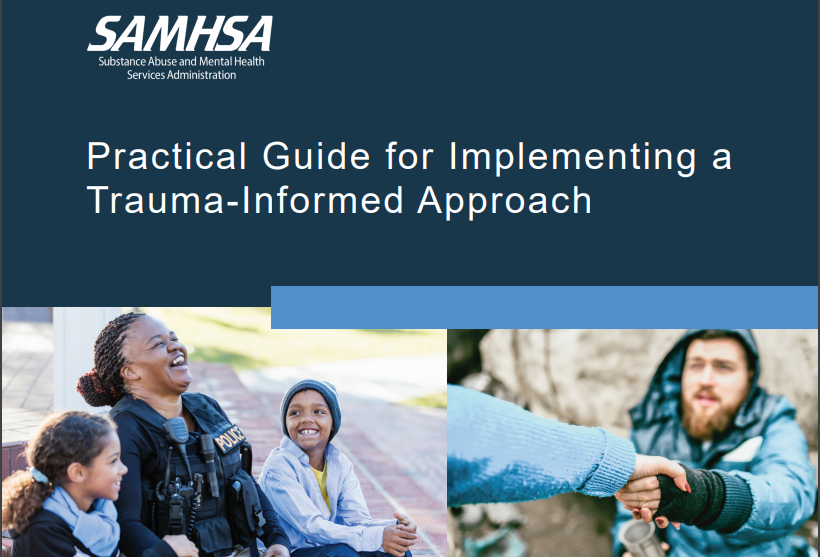It is widely accepted that the roots of trauma-informed care (TIC) as a concept and as a movement grew in the soil conceived and nurtured by the Substance Abuse and Mental Health Services Administration (SAMHSA), a bureau of the US federal government. In the years since the Dare to Vision conference in 1994, SAMHSA has produced three seminal publications that have defined, outlined, and tracked the evolution of the theory and practice of a trauma-informed approach (TIA).
SAMHSA released the most recent of those reports this year: Practical Guide for Implementing a Trauma-Informed Approach, which cites the Traumatic Stress Institute’s Whole-Systems Change Model to TIC (now the Risking Connection Change Model) as one of several frameworks used to develop their guide.
In 2014, SAMHSA published SAMHSA’s Concept of Trauma and Guidance for a Trauma-Informed Approach, which defined the trauma-informed approach while also laying out six principles of TIA and 10 implementation domains to guide organizations and systems trying to make TIA culture change. Along with the work of Roger Fallot, Ph.D., and Maxine Harris, Ph.D., this document is widely cited as the theoretical underpinning of TIA and TIC. Later that same year, SAMHSA released Tip 57: Trauma-Informed Care in Behavioral Health Services.
Now, in 2023, SAMHSA describes the primary goal of its Practical Guide is to expand the discussion presented in SAMHSA’s earlier resources, specifically focusing on tools and strategies for implementing a trauma-informed approach. In the section entitled “Framework for this Resource”, it states, “multiple frameworks describe the process of planning and implementing a TIA at the systems and organizational level” (p. 10) and lists the TSI Whole-System Change Model as one of those frameworks.
TSI developed its Risking Connection Change Model to TIC from nearly 20 years of experience working with whole organizations on the challenging and rewarding task of transforming their organizational culture to TIC. TSI currently supports over 90 organizations across North America to implement and maintain TIC into the very fabric of their culture.
The Risking Connection Change Model addresses the dilemma of so many leaders in organizations who have a “light bulb moment” when they hear about TIC, but are paralyzed about what to do next. Informed by implementation science, TSI’s Model – shown in this infographic – guides organizations step-by-step on an 18-to-24-month journey that includes multiple phases:
- Organizational readiness assessment
- Leadership meeting to educate and build leadership buy-in
- Program evaluation using the Online ARTIC Scale at three time points throughout the initiative
- Formation of an agency-wide Trauma-Informed Task Force to lead the initiative
- Risking Connection Trauma Training for Staff that includes a Train-the-Trainer component
- Development of an agency-wide TIC implementation plan
- Coaching on implementation
TSI’s model recognizes that sustaining TIC over time is even more difficult than implementing it in the first place. For this reason, there are ongoing aspects to the model that help agencies maintain their hard-won progress:
- Organizations adopt Risking Connection© (RC) Trauma Training as a mandated professional development training for their staff in order to "bake it in" to their system
- TSI credentials RC Trainers at each agency to provide RC Basic training to new agency staff, provides continuing education for them via an RC Trainer community, and additionally offers convenient options for an organization to replace any RC Trainers lost through attrition over time
- TSI also trains RC Champions to help reinforce TIC practices in ways beyond formal training, such as leading department teams and conducting supervision using TIC principles
Want to learn more?



